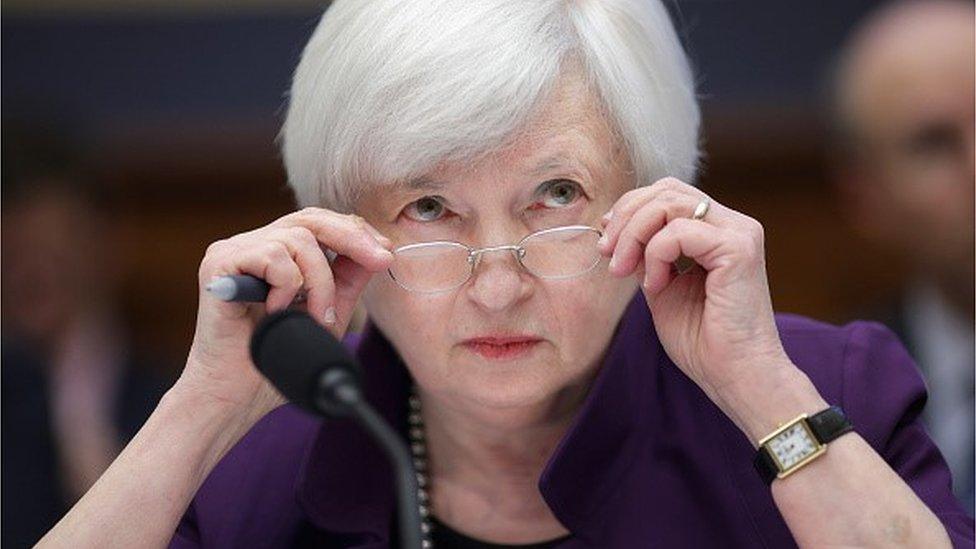December US rate rise 'a possibility'
- Published

A rise in US interest rates in December is "a live possibility", Janet Yellen, chair of the Federal Reserve has told a Congressional committee.
The US central bank holds a policy meeting in December, at which it could decide on a long-anticipated increase in interest rates.
US interest rates have been near zero since December 2008.
Ms Yellen has previously said that rates were likely to rise by the end of this year.
Interest rates were not officially on the agenda for this hearing, and it took up only a very small part of the session.
But this is the single issue that has most preoccupied financial markets all year, with China's economic slowdown running a close second at times.
"What the committee has been expecting is that the economy will continue to grow at a pace that is sufficient to generate further improvements in the labour market and to return inflation to our 2% percent target over the medium term," Ms Yellen told the Financial Services Committee of the House of Representatives.
"If the incoming information supports that expectation then our statement indicates that December would be a live possibility," she added.
She said the Fed believed that the some of the risks, arising from international economic and financial developments had diminished. That was about the economic slowdown in China and other emerging economies.
Final opportunity
If rates are raised, she said it would be based on a view that inflation would move up towards the Fed's target of 2%. She said that view would be justified, another strong hint that a rate rise is very much a possibility.
A meeting of the Fed's policy committee in December is the next and final opportunity for the Fed to do it this year.
The dollar rose following her comments.
Higher interest rates would make some dollar assets more attractive, so the increased prospect of a rise increases demand for the US currency.
Having rates effectively at zero was an exceptional move that reflected the severity of the financial crisis and the wider economic damage it did.
It's worth emphasising that this zero rate was the level the Fed targeted for lending between the banks, called the Federal Funds Rate. It does influence rates throughout the economy, but it doesn't follow that any individual or institution that is not a bank can get a zero-interest loan, though as it happens there have been occasions when the US government has been able to do just that.
At some stage, the Fed is sure to start raising rates and bring its policy back towards normal.
In late September Ms Yellen said, external: "I anticipate that it will likely be appropriate to raise the target range for the Federal Funds Rate sometime later this year".
There is no definite commitment there, and she has always made it clear the decision would depend on what new data tell her and the rest of the Fed's main committee about the state of the US economy.
And there have been some disappointing figures. Economic growth in the third quarter of the year and job creation in September were both below what was expected. Those figures weighed against a rate rise this year.
So the markets took it very seriously when she made it clear to the Congressional Committee that a December rise is very much still on the cards.